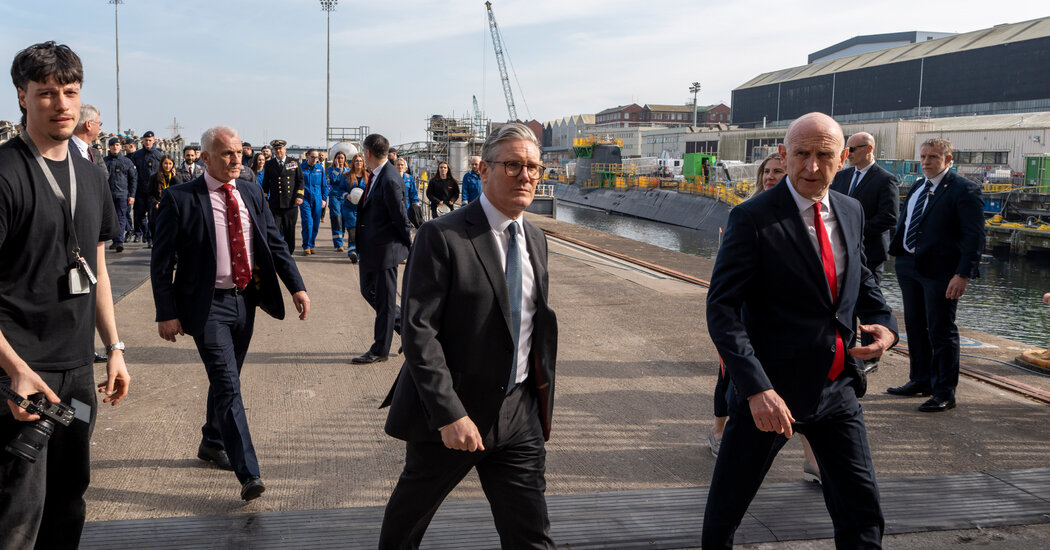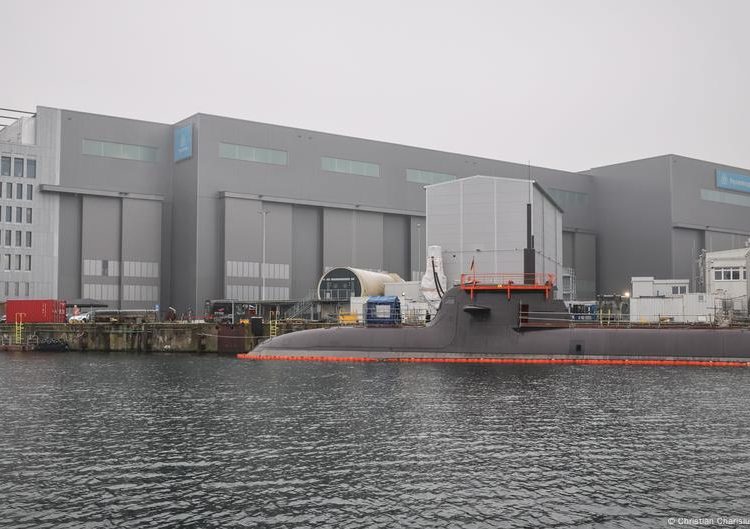Prime Minister Keir Starmer of Britain promised on Monday to bring his country to “war-fighting readiness” as he announced plans to build up to 12 new attack submarines and invest billions of pounds in nuclear and other weaponry as part of new military strategy for a more dangerous world.
“The threat we now face is more serious, more immediate and more unpredictable than at any time since the Cold War,” Mr. Starmer said at a media conference on Monday morning, pointing to “war in Europe, new nuclear risks, daily cyberattacks,” and “growing Russian aggression,” in British waters and skies.
“I believe that the best way to deter conflict is to prepare for it,” Mr. Starmer added, speaking at an industrial facility in Glasgow, ahead of the release of the government’s strategic defense review, which will outline plans to increase production of drones and increase stockpiles of munitions and equipment.
Britain’s ambitious rearmament plan comes against the gathering clouds of Russia’s attacks on Ukraine, American disengagement from Europe and rising global tensions. Mr. Starmer presented his plans hours after one of the most intense aerial bombardments of the three-year war, with Ukrainian drones striking air bases deep in Russian territory.
The review, led by George Robertson, a former secretary general of NATO, was set up last year soon after Mr. Starmer won a general election. But its task was given fresh urgency amid growing evidence of President Trump’s weakened commitment to European security and his ambivalent and at times ingratiating attitude toward President Vladimir V. Putin of Russia.
The review is scheduled for release on Monday afternoon but among the recommendations made public in advance by the government were the procurement of up to 7,000 British-built long-range weapons and the creation of a new cybercommand, alongside an investment of a billion pounds, equivalent to $1.35 billion, in digital capability.
Money will be invested in protecting critical British underwater infrastructure as well as in drones which have proved highly effective in the war in Ukraine.
More than £1.5 billion of additional funding will be put into repairing and renewing housing for the military as the government aims to help recruitment and retention in the British Army, where numbers have fallen to the lowest level since the Napoleonic era.
On Monday, the government stressed the benefits for the domestic economy of investing in rearmament, but the question hanging over the new strategy is how much, in fiscally strapped times, the British government can afford to spend.
Mr. Starmer has promised to increase Britain’s outlay to 2.5 percent of gross national product, paying for it by diverting resources from overseas aid development. Speaking to the BBC, he said Britain needed “to go on from there,” but added that he could not set a precise date for when that number would rise to 3 percent until he was sure of exactly where the money would come from.
In a statement, the government said its conventionally armed nuclear-powered submarine fleet would be significantly expanded, with up to 12 new vessels to be built as part of a security alliance with the United States and Australia, known as Aukus, which is designed to counter China’s growing influence.
The government described the new strategy as a “landmark shift in our deterrence and defense: moving to warfighting readiness to deter threats and strengthen security in the Euro Atlantic area.”
Speaking on Monday, Mr. Starmer was at pains to restate Britain’s commitment to NATO and the trans-Atlantic alliance, a strategy he has pursued by assiduously cultivating Mr. Trump on security and trade issues.
But among the eye-catching recommendations expected from the review is one to consider purchasing fighter jets capable of firing tactical nuclear weapons, a potential harbinger of declining British dependence on the American nuclear umbrella.
Writing on social media, Mike Martin, a lawmaker for the Liberal Democrats and a military veteran, said that the details known so far about the review were a “sign that the U.K. government no longer fully trusts the Americans to be engaged in European security.”
He wrote: “The drop dead giveaway is the air dropped nuclear weapons,” adding that “this is a key capability that the US provides that enables nuclear escalation without going all the way up to destroying Moscow with nuclear weapons fired from our submarines.”
British governments have produced defense reviews at least once a decade since World War II: The last one was conducted in 2021 and updated in 2023.
Mr. Robertson, who is now a member of the House of Lords, was assisted by Fiona Hill, a former adviser to the first Trump administration, and Richard Barrons, a former deputy chief of Britain’s defense staff. Ms. Hill, a British-born expert on Russia, emerged as a vocal critic of Mr. Trump’s dealings with Mr. Putin after she left the National Security Council in July 2019.
The tone of the latest document is likely to be different from that produced four years ago in which the Conservative government of Boris Johnson promised to bind itself closer to the United States. That review laid out Mr. Johnson’s vision of a post-Brexit “Global Britain,” one that his successors largely discarded and which Mr. Starmer has replaced with an effort to reset ties with the European Union.
Stephen Castle is a London correspondent of The Times, writing widely about Britain, its politics and the country’s relationship with Europe.
Mark Landler is the London bureau chief of The Times, covering the United Kingdom, as well as American foreign policy in Europe, Asia and the Middle East. He has been a journalist for more than three decades.
The post U.K. Faces Most Serious Military Threat Since Cold War, Starmer Says appeared first on New York Times.




